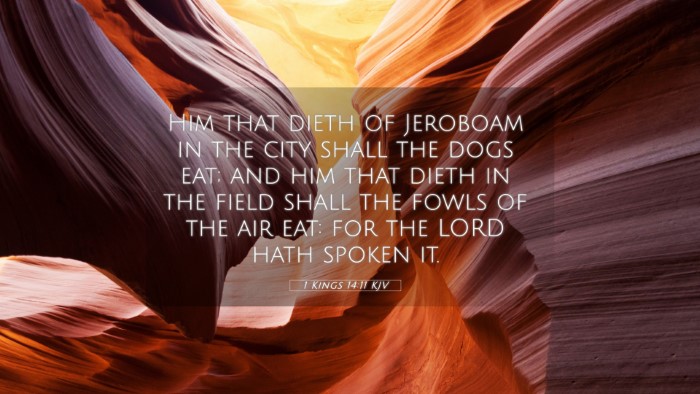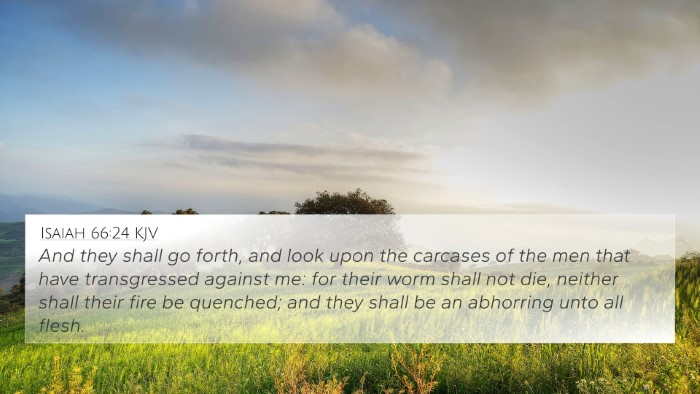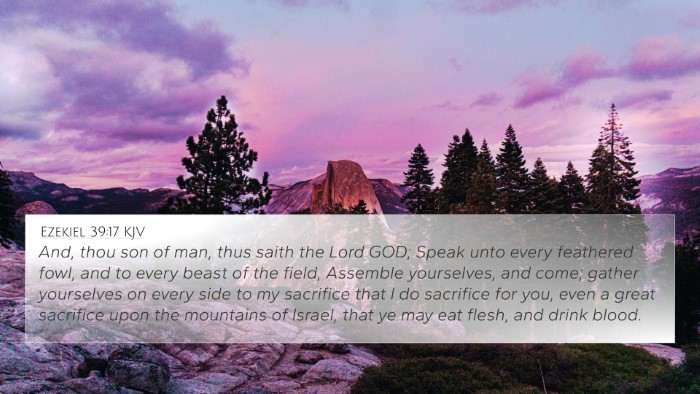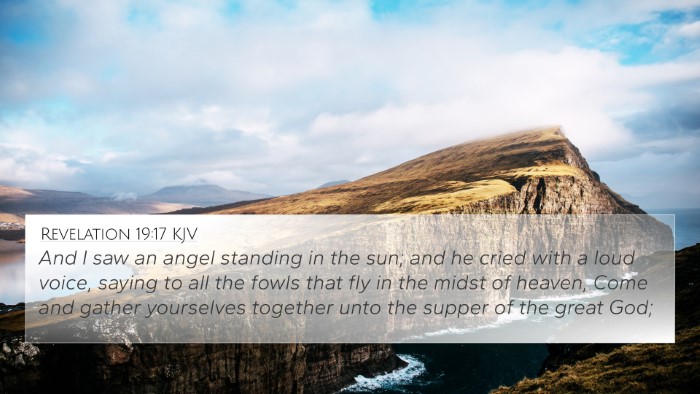Understanding 1 Kings 14:11
The verse 1 Kings 14:11 states: "Him that dieth of Jeroboam in the city shall the dogs eat; and him that dieth in the fields shall the fowls of the air eat: for the Lord hath spoken it." This profoundly signifies God’s judgment upon Jeroboam and his lineage due to their grievous sins and idolatry.
In this analysis, we will explore the insights from renowned public domain commentaries to provide a deeper understanding of this passage.
Exegesis and Commentary Insights
-
Matthew Henry:
Henry describes this verse as a grim indication of divine retribution. He emphasizes that the manner of death signifies utter disgrace and separation from God’s protection; even the bodies of Jeroboam's descendants will meet a dishonorable fate. Henry notes that this shows the seriousness of God’s judgment against unfaithfulness.
-
Albert Barnes:
Barnes elaborates on the prophetic nature of this pronouncement, mentioning that the dogs and birds feasting on the remains reflect not just physical death, but spiritual death and abandonment from God. Barnes connects this to the larger narrative of Israel's kingship, illustrating how God’s instructions were repeatedly ignored, leading to the inevitable consequences outlined in this verse.
-
Adam Clarke:
Clarke draws attention to the starkness of this prophecy, highlighting the complete destruction of Jeroboam's house. He points out that this prophecy serves as a stark reminder of the holiness of God and His intolerance of sin, showing that no lineage will stand if it is established upon unrighteousness.
Thematic Connections to Other Biblical Verses
In scripture, this verse is linked to many other passages that reveal the themes of judgment, idolatry, and divine retribution. These connections serve to enhance understanding and provide context:
- 1 Kings 21:23 - The reference to Ahab’s family destruction reinforces the certainty of divine judgment for wickedness.
- 2 Kings 9:10 - This continues the theme of dogs consuming bodies as a symbol of disgrace.
- Jeremiah 16:4 - This verse mirrors the theme of disaster and misfortunes resulting from turning away from God.
- Isaiah 34:3 - The imagery of the unclean animals consuming the dead underscores God’s severe rejection of the unfaithful.
- Ezekiel 39:17-20 - This passage reiterates the idea of God’s judgment leading to dishonor among those who offend Him.
- Matthew 10:28 - This New Testament verse emphasizes the importance of fearing God over man, aligning with the fate of the unfaithful as portrayed in 1 Kings 14:11.
- Revelation 19:17-21 - The ultimate judgment depicted at the end of days connects back to the theme of addressing sin and rebellion against God.
Connecting Themes: Idolatry and Divine Judgment
The primary focus of this passage is the dire consequence of leading Israel into idolatry, a theme that is echoed throughout the scriptures. This highlights a core message of biblical theology: idolatry brings about divine judgment.
Inter-Biblical Dialogue
-
Idolatry's Consequences:
Consistently, throughout the Old Testament, individuals or nations that turn away from God face dire consequences. This serves to illustrate a consistent biblical principle—God's demand for fidelity to Him alone.
-
The Role of Prophets:
Prophetic warnings are a thread that connects both Old and New Testaments. The prophetic voices convey God's displeasure and the imminent consequences of disobedience, as seen in both Jeroboam’s story and the teachings of Jesus.
Practical Applications and Reflections
Reflecting on 1 Kings 14:11 serves as an opportunity for self-examination regarding faithfulness to God's commandments. In today’s context, it raises questions about what modern-day idols may lead us away from God, urging an ongoing pursuit of righteousness and accountability.
Conclusion
The verse 1 Kings 14:11 serves as a powerful reminder of God’s sovereignty and the gravity of sin. By exploring various commentaries and connecting it to other scriptures, we see a mosaic of themes emphasizing the terrifying repercussions of idolatry and the irreducible nature of God’s divine justice.
Engaging in cross-referencing biblical texts enhances our understanding and fosters a deeper connection to the narrative and doctrines of faith.









